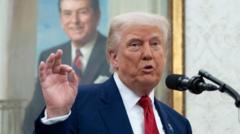The Court of International Trade ruled against Trump's sweeping tariffs, stating that the president does not have the authority to impose such duties unilaterally. The White House has appealed the decision, while small businesses and global markets await the outcome.
Court Ruling Strikes Down Trump's Tariffs: What’s Next for US Trade Policy?

Court Ruling Strikes Down Trump's Tariffs: What’s Next for US Trade Policy?
A federal court's decision to block President Trump's tariffs has raised questions on the future of US trade relations and economic strategies.
A US federal court has dealt a significant blow to President Donald Trump's tariff strategy, ruling that he overstepped his authority in implementing sweeping tariffs on imports. The Court of International Trade determined that an emergency law invoked by the White House does not grant the president the unilateral power to impose tariffs on a wide range of countries. The Manhattan-based court reiterated that the US Constitution reserves the exclusive power of regulating commerce with foreign nations for Congress, a power that the president cannot override in times of economic concern.
The court's ruling comes in response to a lawsuit filed by the Liberty Justice Center, which represented five small businesses adversely affected by Trump's so-called "Liberation Day" tariffs. In its judgment, the three-judge panel found that the International Emergency Economic Powers Act (IEEPA), a law established in 1977, does not authorize the sweeping import taxes that the Trump administration has enacted, targeting numerous countries.
Furthermore, the court also halted additional levies imposed on China, Mexico, and Canada, which were justified by the Trump administration as necessary to combat drug smuggling and illegal immigration into the US. Notably, the ruling did not extend to more specific tariffs, such as those imposed on goods like cars, steel, and aluminum, which fall under different legislative provisions.
The White House has criticized the court’s ruling. White House deputy press secretary Kush Desai asserted, "It is not for unelected judges to decide how to properly address a national emergency." Conversely, New York Attorney General Letitia James applauded the decision, declaring that it affirms that no president possesses the authority to unilaterally tax American families and businesses. James added that sustaining these tariffs would contribute to inflation and potential job losses nationwide.
The global reaction to the ruling was broadly positive, with stock markets in Asia experiencing increases, and US stock futures also improving. Analysts suggest that this ruling could stabilize market uncertainties linked to lengthy trade negotiations and tariff disputes, alleviating concerns over Trump's erratic trade policies. Stephen Innes at SPI Asset Management noted that the judges delivered a clear message indicating that "the Oval Office isn't a trading desk," suggesting that executive overreach may have its limits.
In the coming weeks, the administration has a ten-day period to navigate the bureaucratic process of rescinding the tariffs, although many are currently held in suspension. The appeal process will follow, with the potential for higher courts to offer more favorable outcomes for the White House. Should the ruling be upheld through the judicial system, businesses that paid the tariffs could receive refunds, accompanied by interest.
The backdrop to this ruling stems from Trump's earlier implementation of a global tariff regime beginning on April 2, which saw baseline tariffs applied broadly alongside steeper tariffs on key trading partners, including the EU, UK, Canada, Mexico, and China. While initial hopes centered on boosting American manufacturing and protecting jobs, the ensuing trade war with China complicating the global economic landscape led to turbulent market reactions as tariffs fluctuated in response to negotiations between the two superpowers.
The outcome of this court ruling and the subsequent appeal will undoubtedly shape the future of US trade policy while highlighting the constitutional balance of power within the federal government as it relates to economic regulation and international relations.



















